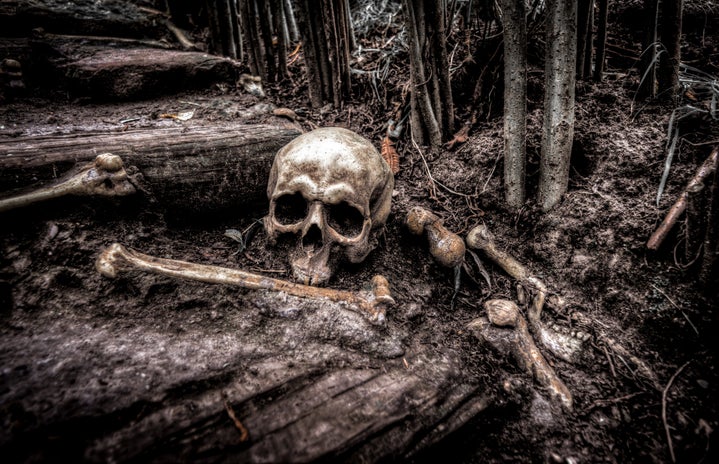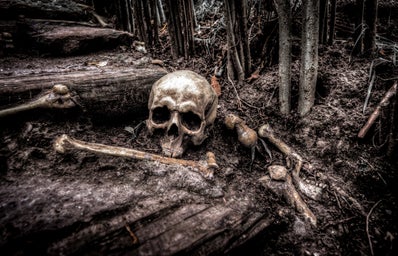“The oldest and strongest emotion of mankind is fear, and the oldest and strongest kind of fear is fear of the unknown.”–H.P. Lovecraft
I recently read one of H.P. Lovecraft’s most acclaimed short stories, A Shadow Over Innsmouth. Having listened to a few podcasts in the cosmic horror genre, I was interested to explore the origin of the genre, not only for fun but also out of a sort of academic curiosity. What I found was interesting indeed, and I have developed a few thoughts on this author and his eldritch legacy.
H.P. Lovecraft managed to define a genre while huddling in his New England home, rarely going outside or interacting with other human beings. He was a man afraid of nearly everything–his list of fears ranges from fish to air conditioners to non-Euclidean geometry. An extensive catalog of fears is a useful tool for a horror author, surely, but it becomes loathsome when we learn that this list extended to people as well. Lovecraft was a racist and a xenophobe, and his bigotry did not go unexplored in either his speech or his writing. His fear and hatred of people who were different from himself were abnormal even for a man of his time, and we cannot neglect the impact that this had on his work, or on his iconic legacy of exploring the “fear of the unknown.”
Let me stress that this is not an article about separating a work from its creator. The choice of whether or not you can enjoy a work with a problematic creator is a personal decision, and I do not begrudge anyone for making that choice. I am more interested in examining the impact of this man’s work on a genre that he created, and the ways that some modern horror writers have been overcoming Lovecraft’s smallmindedness. It is also important to emphasize that I do not consider myself an expert on this genre, and am offering my thoughts as someone who has just begun exploring it. I have consumed fairly few works in this genre, but I feel each has had something interesting to say about the genre as a whole, and I am excited to explore those messages.
The Shadow Over Innsmouth is a story about a student exploring the small seaside town of Innsmouth, a community closed off to outsiders and deeply shrouded in mystery. The student meets helpful strangers along his way who fill in the story for him–the story of a businessman who got a little too greedy, and struck a deal with the frightening undersea creatures off the shore of Innsmouth in exchange for riches and possibly even immortality. The people of Innsmouth would occasionally give sacrifices to the eldritch sea god of the fish people and would mate with them, so that over time, their children would have the ability to live forever under the waves. The student, though thoroughly frightened by the time he learns all of this, must stay overnight in the shady hotel in town, and he runs into some trouble as he attempts to stay safe till morning.
The story is fairly typical Lovecraftian horror–frightening and unknowable gods, secret horrors hiding in the depths of the ocean, and a lonesome protagonist wandering through danger, his sense of safety unraveling as he learns more about his circumstances. I was engrossed in it even though I had already known the story. Lovecraft has a talent for creating a terrifying atmosphere, and for making even the mundane frightening. “Certainly,” his protagonist notes as he wanders through the abandoned parts of town, “the terror of a deserted house swells in geometrical rather than arithmetical progression as houses multiply to form a city of stark desolation.” His prose, though a bit flowery, takes an empty street and turns it otherworldly, striking his reader with thoughts of what may be behind those walls. Lovecraft’s legacy endures for a reason–he is a talented writer, and has set a tradition of finding horror everywhere he looks.

The story is certainly not without faults, however, even in Lovecraft’s storytelling craft itself. Many people have criticized his tendency to dump information on the reader in the form of monologues from secondary characters, complete with full names and dates. A reader could easily think that they were reading essays on the history of Innsmouth rather than the words of a character who has only heard stories and myths of the mysterious town. It can be tedious to wade through all of this information in the beginning of the story because of this.
The worst flaw of The Shadow Over Innsmouth, however, is its blatantly racist and xenophobic message. Even ignoring the occasional explicitly bigoted comments from main and side characters alike, the story itself is rooted in the fear of other cultures and civilizations. It was not an accident that Lovecraft, a man terrified of interracial relationships, created a fictional race of creatures and imagined that the most horrific thing they could do would be to integrate the people of Innsmouth into their society and cultural practices. Human sacrifices are indeed mentioned in the story, but this is by an unreliable, drunken narrator, in a story where people disappear simply to join another culture under the sea. Accusations of dark rituals and vaguely frightening religious practices are something that have been leveled against indigenous cultures for centuries. The horror of Innsmouth is rooted not in the unknowable nature of the universe or of the creepiness of a near-abandoned town, but the fear of the other. It demonstrates an inability and unwillingness to extend a hand to a culture besides your own, and it would be incredibly difficult to divorce this story from its bigoted roots.
So where does that leave the genre of cosmic horror? How do modern writers evoke the fear of the unknown while rejecting the fear of “the other?”
As I said, I am not well-versed in the genre as a whole, so I cannot provide an extensive or encompassing answer to the question. What I can do is explore the two works that introduced me to cosmic horror, and the ways that they have made the genre their own, taking Lovecraft’s legacy of fear and turning it into one of hope.
The first piece of cosmic horror fiction I ever experienced was Welcome to Night Vale, a fiction podcast about a town “where every conspiracy theory is true.” The narrator, Cecil, is the local radio host of a small desert town named Night Vale, in which strange and frightening things happen every day as citizens continue to go about their daily lives and participate in their community. Some of these frightening things include the “Glow Cloud” (all hail) which occasionally drops animal carcasses along the streets of town, but is also on the school board of Night Vale Elementary School. There is also the dog park, which no dogs or humans are permitted to enter, and which is filled with hooded figures that citizens are encouraged to avert their gazes from.
Despite being filled with horrors such as these, the tone of Welcome to Night Vale is an odd combination of creepy and uplifting. Our narrator, in between updates on gruesome news or strange decrees from the city council, talks about his crush on the new scientist in town or his affection for his friend Josie, sprinkling the normality of small town life into an abysmal landscape. Citizens are often rising up against injustices, inspired by the loss of friends and of freedoms. The show uses the aesthetics of Lovecraftian horror, but twists the conventions of the genre–it takes the unknown and makes it mundane. It is a fact of life that citizens must attend their bloodstone circle rituals every once in a while. Sometimes threatening and mysterious helicopters will appear in the sky, and the only recommended response is to have your children play inside that day.
It may strike us as absurd, but it is a comment on the nature of human life–we are surrounded by systems and phenomena that we can never fully understand, which have control over our lives despite our lack of input. Whether these structures be natural, like natural disasters or climate change, or man-made, like our political and economic systems, we are forced to participate and make the best of the results. The horrors that surround us cannot and should not stop us from living our lives to the fullest–continuing to make fulfilling relationships and striving to make our world as good as it can be.
Another work of cosmic horror that inspired my interest in the genre is The Magnus Archives, an audio drama that revels a bit more in actual horror than Welcome to Night Vale does. Where Welcome to Night Vale uses the aesthetics of cosmic horror as a backdrop for human (and inhuman) stories about community and justice, The Magnus Archives begins purely as a horror anthology, until its listeners gradually begin to realize that everything is more connected than it seems. We begin with Jonathan Sims, Head Archivist of the Magnus Institute, an organization that collects and investigates stories about the supernatural. He begins as a detached narrator, reading people’s stories and explaining the Institute’s research on them, until the supernatural slowly begins to invade his own life. He and the other archive workers are not safe, he realizes, and may in fact be inextricably tied to this vast catalog of horrors.

The horror of The Magnus Archives is rooted in the fear of the unknown just as much as typical Lovecraftian horror. The interesting twist is that the premise of the show is the quest to know and understand these horrors–that is the job of an archivist, to file away all pertinent information. The genius of it all is that the show gets no less frightening as mysteries are unraveled and knowledge is uncovered. It leads the listener to wonder: is knowledge a blessing or a curse? Where does the actual horror lie? In what we do not yet know, or in what we know but wish we didn’t?
Additionally, The Magnus Archives spins a web of insurmountable and horrific systems similar to those of Welcome to Night Vale. The horrors in these shows are more powerful than any human could ever be. The best we can wish for is that they are too great to bother noticing us, so that perhaps we can escape their wrath. However, even in the face of these odds, even in the face of a much darker tone and bleaker future than the one set up by Welcome to Night Vale, The Magnus Archives still refuses to give up on the importance of the human experience. Things are bad, the show says. We are afraid. We don’t know what to do. But we can still try, and we can still do our best to protect and value one another along the way. Our world may be run by vast and incomprehensible systems of fear, but you, the person standing in front of me, are still worth fighting for. You are still worth loving, even if that love is imperfect and a happy ending is not guaranteed.
H.P. Lovecraft created a genre that resonated with readers because it was so effective at striking fear. His stories feature lonesome protagonists wandering through insurmountable dangers with little chance of making it out on the other end. They are bleak, and allow us to ponder the worst of what the world has to offer.
Welcome to Night Vale and The Magnus Archives do not really try to argue with these premises. They do indeed ponder the worst. But instead of freezing in fear as Lovecraft’s protagonists do, instead of running and wallowing in isolation, they continue trying. They refuse to accept the idea that because the world is horrific, we can do nothing but accept it and live in misery and fear. At some point, they argue, we must continue living. Perhaps we will go on to challenge the horror, or perhaps we will create our rebellion by simply finding our happiness where we can get it. Either way, these stories exemplify the incredibly human act of refusing to accept hopelessness.

They are also some of the most inclusive stories I have ever experienced. Both feature queer main characters and diverse casts. They have found plenty of material to inspire horrifying storylines that do not involve the demonization of people of color or people from other cultures. Cultural diversity is celebrated rather than maligned, and plenty of the horror in them stems from systemic oppression and control, highlighting issues that still affect minorities today. These shows, though imperfect as all media is, not only rise above the very low bar set by Lovecraft but also the bar set by modern traditional media. They step forward rather than back, striving to represent multiple voices and refusing to allow horror to be associated with exclusion.
So, from my limited perspective, the future of the cosmic horror genre is fairly bright. The creators that introduced me to the genre showed me much more inclusive and hopeful stories than Lovecraft’s. The ability to look at inspiration and take only what will contribute to better and better stories is one that I admire greatly in a creator. I hope that the genre of cosmic horror continues to reject the problematic aspects of its origin, and instead transcends them, describing the human experience in a way that H.P. Lovecraft never could.




